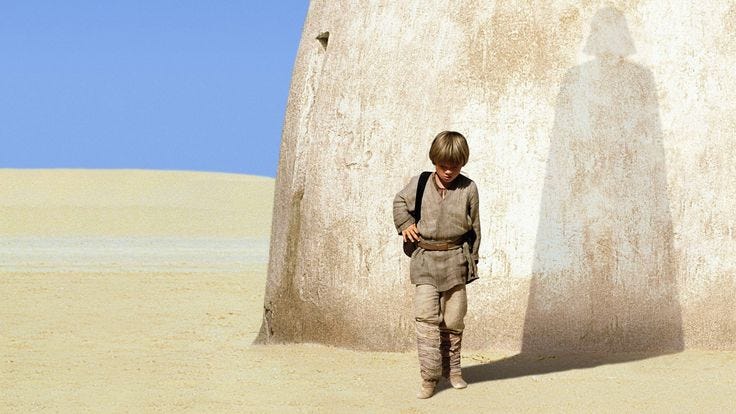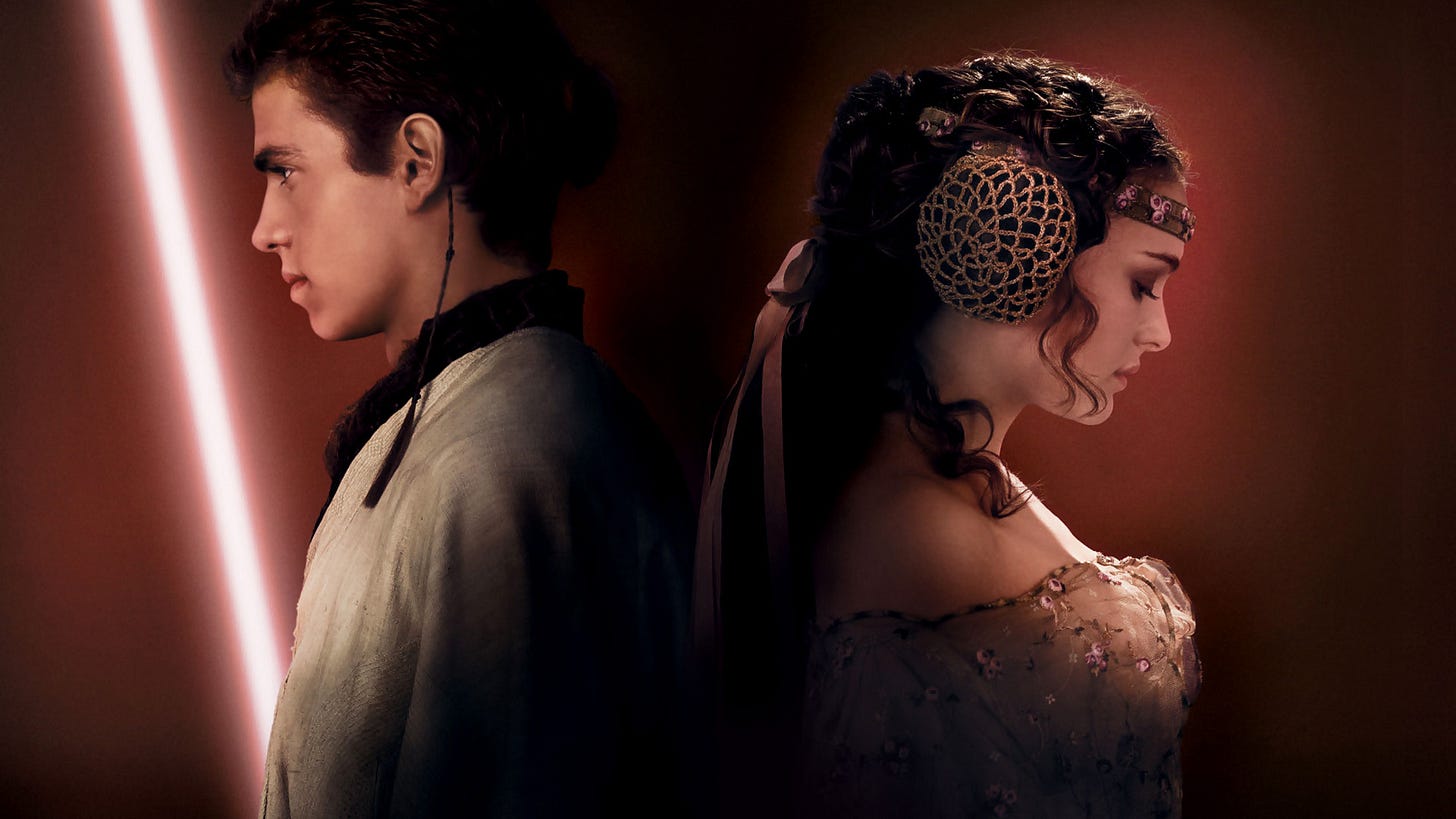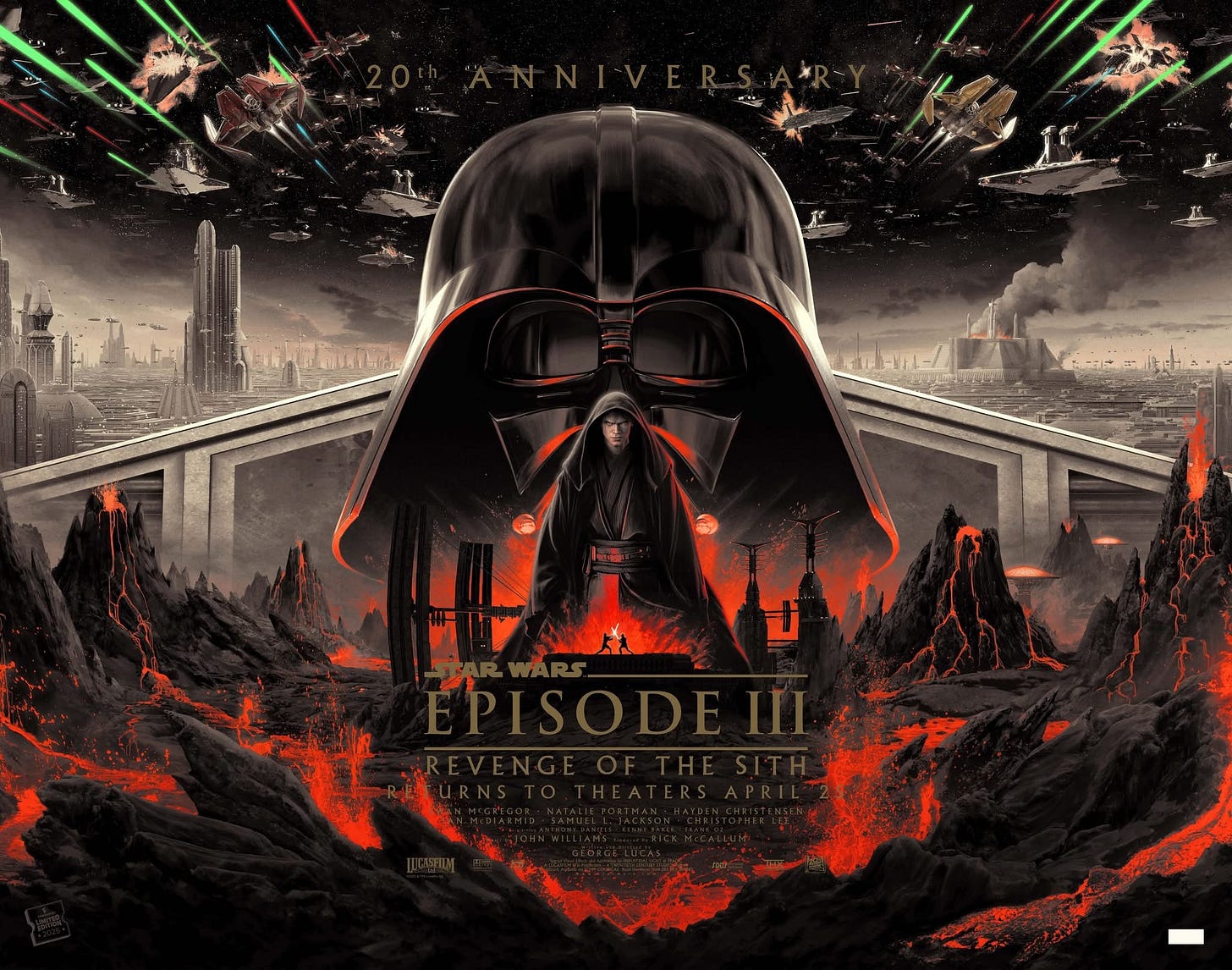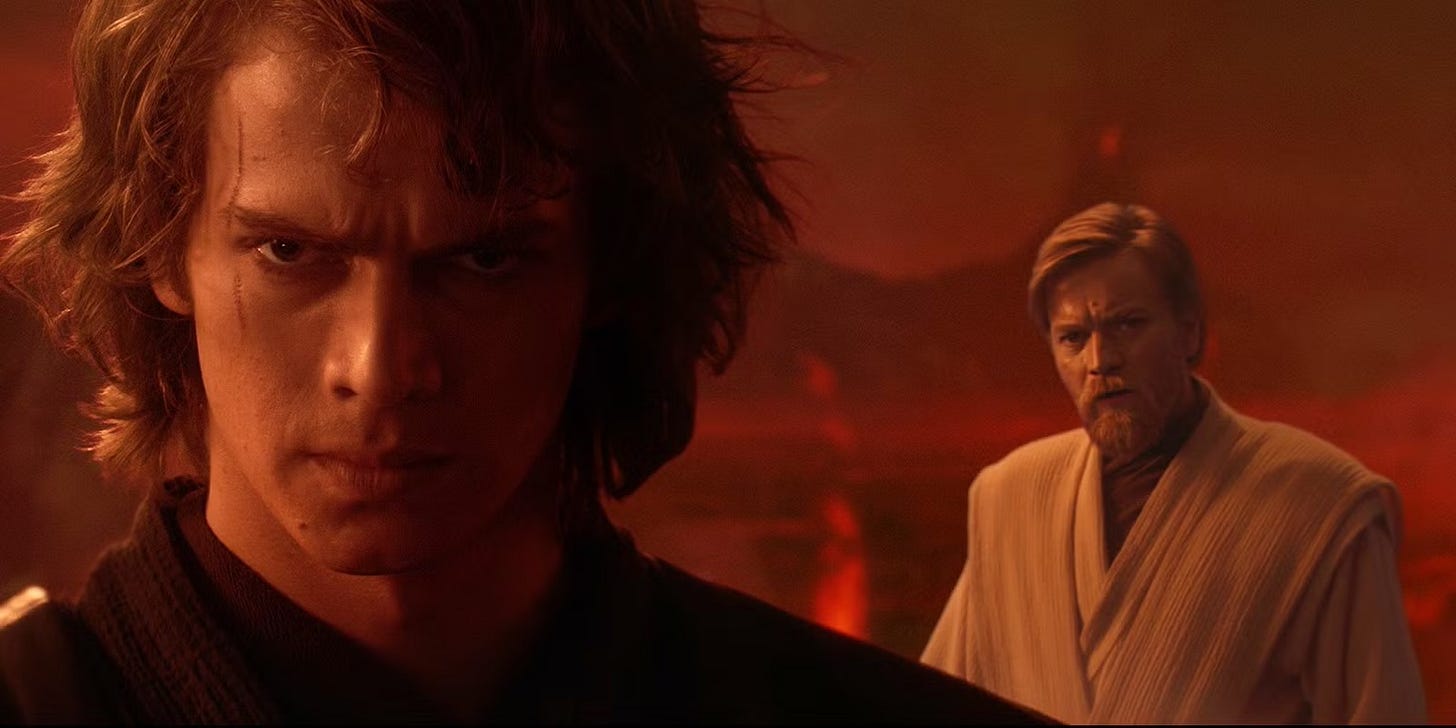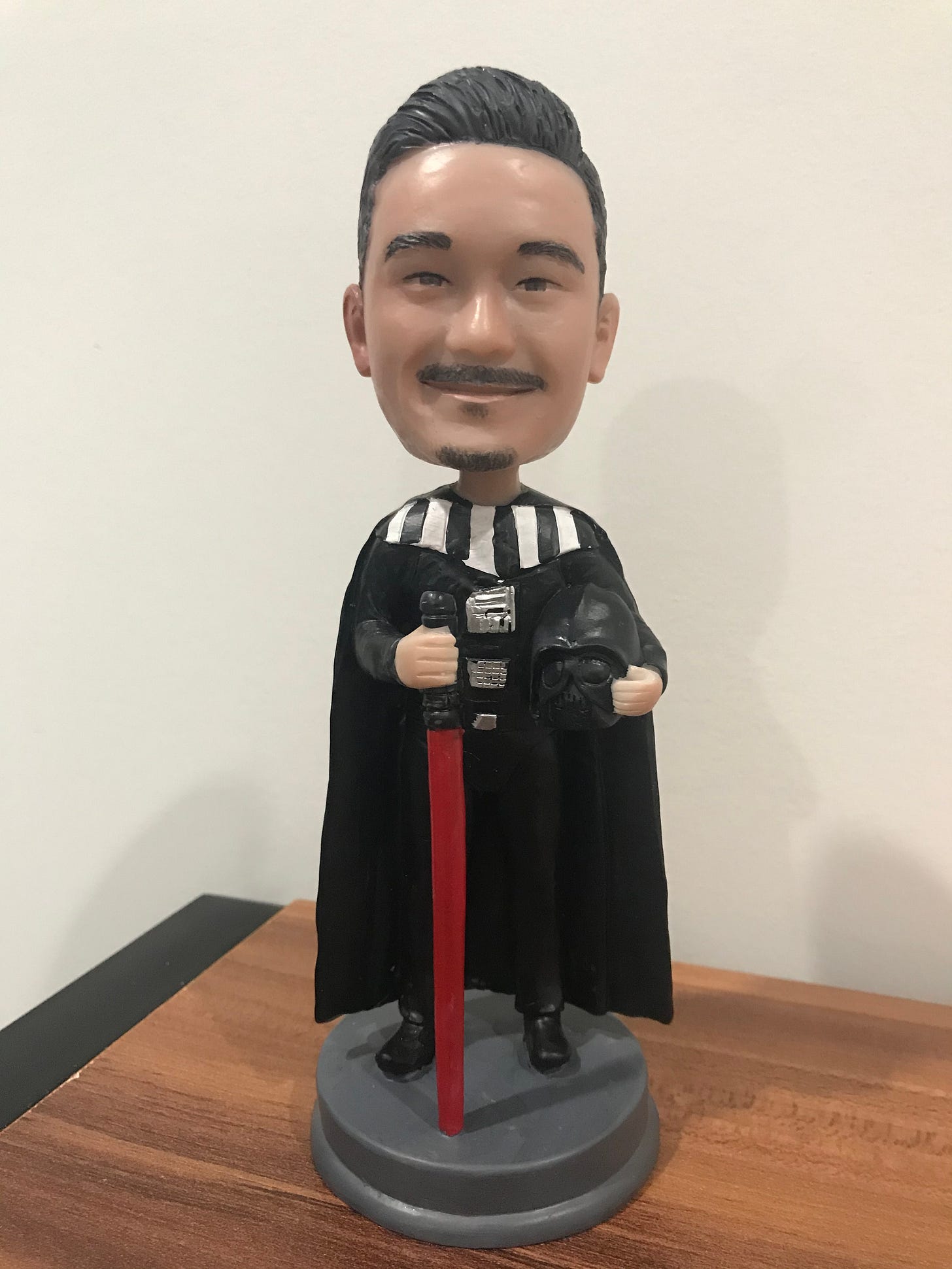Why I've always related to Anakin Skywalker as an adoptee
Revisiting the iconic character on the 20th anniversary of Revenge of the Sith
My earliest childhood memories are of Star Wars. I remember watching the original trilogy on VHS over and over, so often in fact that my parents eventually had to show four-year-old me how to use the tape rewinder by myself. One could say Star Wars became a foundational text for me, even more so than The Bible, despite my family’s insistence on attending church every Sunday.
Fast forward to May 1999. Even though I had just started kindergarten the previous fall, I can still remember the visceral experience watching Star Wars on the big screen for the first time—the pod races, the lightsaber duels, the space battles. I didn’t understand of course any of the political machinations at play, the same way I didn’t understand why I related so much to this blonde-haired boy (besides the fact that we had the same haircut) who was suddenly being separated from his mother and whisked away on a starship.
As an adoptee, especially a transracial one, even from a young age I knew that I was different from all the other kids. This feeling was amplified once I started going to school. It’s difficult to put into words what it felt like to experience racism for the first time. But being the only Asian kid on the school bus made me acutely aware of how different I truly was and how I was destined to always feel like an outsider.
By the time Episode II came out, I was eight and just finishing up the third grade. I was still playing with action figures back then and only vaguely aware of what was happening in the world at-large. War, for me, was still just something that happened on TV. And although I understood the severity of events like 9/11, I had very little comprehension of whatever this so-called “war on terror” was actually all about.
So when I saw first saw Attack of the Clones, I had only a basic comprehension of what was at stake for these characters. I was old enough to understand that war was bad. I had watched enough movies and had seen plenty of it on live TV whenever my parents turned on the nightly news. But it wasn’t until I was much older that I began to understand the prequels and the whole series on a deeper, more personal level.
In Episode II, Anakin Skywalker now played by Hayden Christensen (who is much better in these films than people give him credit for) is torn between his commitment to the Jedi Code and his attraction to former the Queen of Naboo, now senator, Padmé Amidala. Jedi are forbidden from falling in love or from having any emotional attachments whatsoever. This is why Jedi are typically taken away from their families at a very young age, to prevent them from forming any attachment to their birth families.
Anakin, however, is not your typical Jedi. Having been separated from his mother when he was much older, after having already known love and therefore attachment, he is driven more by his emotions than other Jedi. He also appears at times to be overwhelmed by these emotions which leads him to behave recklessly, much to the chagrin of his mentor Obi-Wan Kenobi and the other Jedi on the High Council. Anakin is also more naturally gifted and inherently strong with the Force for reasons both prophetically and biologically.
Believed by many to be the Chosen One, a force-user prophesied to bring balance to the Force, he is also under immense scrutiny by the other Jedi in the Order who expect him to fulfill said prophecy. This external pressure, coupled with his own arrogance regarding his abilities, is what eventually leads him down the path to the Dark Side.
Similar to Anakin, I’ve often felt there were certain expectations I was meant to live up to. Like many adoptees, I was often told the story of how I was chosen, how my arrival brought hope and happiness to so many. To my parent’s credit, they always did their best to build me up and imbue confidence in me. Throughout my childhood I was always told that I was special, even if all the other kids at school treated me like a pariah.
But as a kid, sometimes the worst thing you can do is stand out, and when you wake up everyday afraid to go to school—afraid of being bullied, afraid of violence—you’re forced to see the world through a different lens. So like Anakin, the trauma I experienced as a child instilled in me a deep sense of mistrust for others and a skepticism towards systems of belief. This served antithetical to everything they were trying to teach me in Sunday school, but I tried nonetheless to have faith.
Something I’ve always related to was the way Anakin carries himself Episode II. There is a stillness and intensity, an anguish simmering just beneath the surface. He is in constant turmoil, struggling to choose between a commitment to a strict Jedi Code and his own personal feelings and desires. Like Anakin, I also struggled to follow a strict religious doctrine. Growing up in an ultra-conservative church, I was exposed to some horribly regressive and archaic views on gender and sexuality, views I ultimately came to disagree with.
In Episode III, Revenge of the Sith, we see Anakin’s tragic fall to the Dark Side and transformation into Darth Vader. Watching it again on the big screen 20 years later, I found myself feeling quite moved by most of it. It was like being a kid again, seeing Star Wars in the theater for the very first time. Even though I knew exactly how it was all going to unfold, I allowed myself to be totally immersed in the action and the story.
Throughout the film, Anakin is plagued by visions of Padmé’s death. This is eventually used by Chancellor Palpatine, secretly a Sith Lord, to manipulate and turn Anakin to the Dark Side. In one key scene, Palpatine tells Anakin:
“Good is a point of view. The Sith and the Jedi are similar in almost every way, including their quest for greater power.”
The quest for power, spiritual and political, is a crucial part of the Star Wars saga. The rise and fall of the Empire, the construction of the Death Star, even Luke Skywalker’s journey from farm boy to Jedi Master, all are rooted in a struggle to gain a certain amount of power in the universe.
What struck me the most while watching Episode III now 20 years later, was how much the politics in this fictional universe mirrored our own. At the very beginning of the film, the Jedi are concerned over how much power the Chancellor has accrued during the course of the war. The Senate continues to vote in favor of granting him more and more executive powers and he has managed to sway the populace into allowing him to remain in office even after his final term was set to expire.
Anakin, meanwhile, is torn between his loyalties to the Chancellor and his duty as a Jedi Knight. He feels ostracized by the Jedi Council, who have grown increasingly wary of him as the prophesied Chosen One, due to his reckless nature and emotional outbursts. He yearns for greater power and has grown frustrated with the Council for what he perceives as their continued attempts to hold him back. This combined with his fear of losing Padmé is what leads him to turn against the Jedi and join the Dark Side.
As an adoptee, I’ve always had a bit of a chip on my shoulder, stemming from my early experiences in grade school. I’ve also often felt stymied by systems and the powers that be, especially when I was a young writer still struggling to get published. And like many international adoptees, there were times when I have felt completely powerless, like I had zero control over my own destiny.
So for me, it isn’t hard to understand why Anakin makes the choice that he does. As someone who has been at times blinded by the kind of fear and anger that stems from a perceived lack of control over one’s circumstances, I can see how easy it might be to just give in, to be consumed by it.
But what I have learned over time, is that if you let it, it can destroy you, as it does to Anakin. And unlike fiction, there isn’t always a chance at redemption.
Anakin’s failure was that he allowed himself to be manipulated by Palpatine’s words and by a promise of peace and justice. Like all the senators who applauded when Palpatine declared himself Emperor, Anakin allowed fear-mongering and a false promise of security to dismantle their democracy from within, a democracy he’d sworn to protect.
“Good is a point of view, Anakin.”
Anakin believed he was the hero, the same way most people consider themselves to be the heroes of their own story. We lie in bed at night and tell ourselves we’re good people, that our intentions are good, that we are justified... But in a time of such divisiveness, and with so much misinformation and lies being spewed across the airwaves, you have to stop sometimes and take a hard a look in the mirror and ask yourself, am I really the hero? Or am I the villain of this story?


